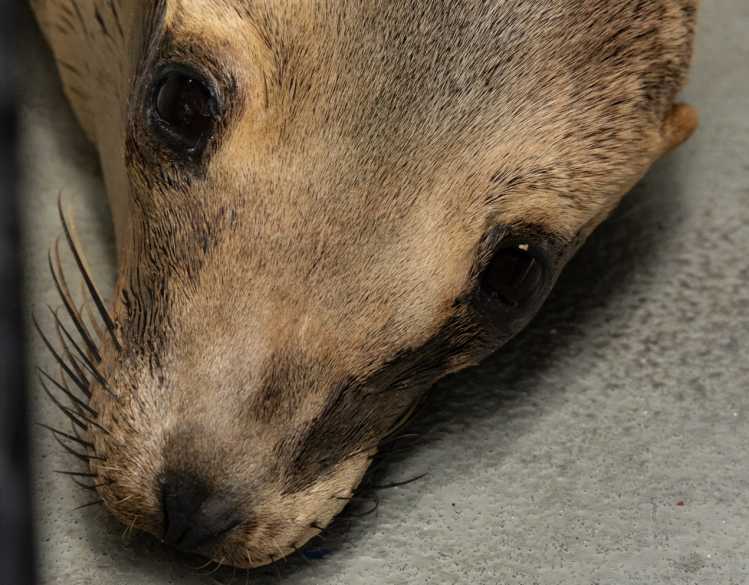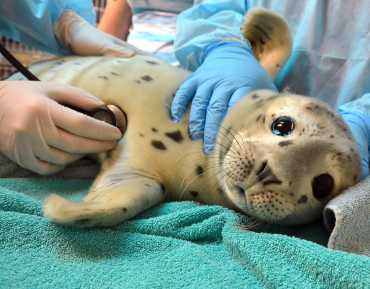
From Treating Sick Sea Lions to Tracking Them in the Wild: Follow Autumn
- Leptospirosis
Have you ever wondered where a marine mammal patient goes after they are released? The Marine Mammal Center is conducting critical disease investigation research and monitoring how our treatments help animals thrive in the wild. Before patients like California sea lion Autumn that recover from leptospirosis return to their ocean home, they may be fitted with temporary satellite tags.
When California sea lion Autumn was spotted on the beach, she was underweight, exhausted and showing signs of distress like open-mouth breathing. Thankfully, a concerned beachgoer called The Marine Mammal Center’s response hotline to give her the help she desperately needed.
Once rescued and at our hospital, Autumn underwent a thorough admit exam and laboratory tests where our veterinary experts confirmed how very sick this sea lion was. She was sadly suffering from leptospirosis, a bacterial infection that affects the kidneys and can be fatal if left untreated.

Sick sea lions diagnosed with leptospirosis are often prescribed antibiotics, fluids and other supportive care, such as medicines for stomach and intestinal ulcers. Our animal care staff and volunteers worked around the clock to provide Autumn with a specialized treatment regimen to help her recover. After about a month, she was given a clean bill of health and ready to return to her ocean home.
Not only did Autumn get a second chance at life, but support from people like you also helps inform our experts as they conduct critical disease investigation research. Leptospirosis is a serious disease we frequently see in California sea lions and can also infect humans and dogs. What our scientists learn from treating patients like Autumn helps us improve our rehabilitative care, better understand how this disease is transmitted, and protect human and animal health.
One sick sea lion may not provide all insight into the health of the greater population, but thousands of sick sea lions rescued over the course of five decades have taught us a lot. As the world’s largest marine mammal hospital, the Center is at the forefront of research on diseases in marine mammals like leptospirosis.
Our experts are leading contributors to global knowledge about ocean health and have published a number of scientific papers on this disease. Take a deep dive into our leptospirosis research here.

To monitor how our treatments help animals thrive in the wild, sea lions like Autumn that recover from leptospirosis may also be fitted with satellite tags. These small, temporary devices are attached to the animal’s fur with a special glue at our hospital before they are released, allowing our experts to remotely track their movements and diving behaviors via satellite.
On the California coast, Autumn traveled to the Farallon Islands, Año Nuevo Island, and down to the Channel Islands and foraged for food near San Miguel Island—a journey made possible with your support.

As we diagnose, care for and track our patients, we’re not just learning about the specific diseases that affect marine mammals, we’re also learning about the health of the ocean as a whole. Animals like California sea lions serve as sentinels of the sea, alerting us to the dangers they face. Treating sick sea lions and other marine mammals can help reveal alarming ocean health threats like climate change, toxins and pollution, and depleted fish stocks.
Ocean health is intricately connected to the wellbeing of marine mammals and humans alike. The work of the Center advances medical knowledge and understanding about these links to inform conservation policy, inspire consumer and corporate behavior change, and protect our future.
As much as this work is about helping each individual animal, it is also about protecting entire marine mammal populations and our own health. Autumn’s second chance at life, along with our vital research making a difference in profound ways, are all thanks to caring people like you.
Yes, I want to save a life!

Yes, I want to save a life!
You’ll be giving sick and injured animals the best possible care at the Center’s state-of-the-art hospital. With your gift today, you are giving a patient a second chance at life in the wild.
See Our Latest News
{"image":"\/Animals\/Wild\/Gray whale\/cropped-images\/two-gray-whales-golden-gate-bridge-shutterstock-0-0-1270-992-1770234810.jpg","alt":"two gray whales under the Golden Gate Bridge","title":"The Marine Mammal Center and San Francisco Harbor Safety Committee Pilot New Vessel Operator Training Program","link_url":"https:\/\/www.marinemammalcenter.org\/news\/the-marine-mammal-center-and-san-francisco-harbor-safety-committee-pilot-new-vessel-operator-training-program","label":"Press Release","date":"2026-02-06 01:00:00"}

The Marine Mammal Center and San Francisco Harbor Safety Committee Pilot New Vessel Operator Training Program
February 6, 2026
Read More{"image":"\/Animals\/Wild\/Bottlenose dolphin\/cropped-images\/dolphinphoto-by-adam-li-c-noaa-0-0-1270-992-1769539954.jpg","alt":"A bottlenose dolphin jumps out of the water.","title":"What\u2019s the Difference Between Dolphins and Porpoises? And Other Animal Trivia","link_url":"https:\/\/www.marinemammalcenter.org\/news\/whats-the-difference-between-dolphins-and-porpoises-and-other-animal-trivia","label":"News Update","date":"2026-01-26 23:00:00"}

What’s the Difference Between Dolphins and Porpoises? And Other Animal Trivia
January 26, 2026
Read More{"image":"\/Animals\/Patients\/Sea otters\/2025\/cropped-images\/so-mooring-release-2-laurie-miller-c-the-marine-mammal-center-USFWS-permit-MA101713-1-147-8-1270-992-1770307740.jpg","alt":"Sea otter - Mooring","title":"Rescue Stories: Southern Sea Otter Mooring Named the 2025 Patient of the Year","link_url":"https:\/\/www.marinemammalcenter.org\/news\/rescue-stories-vote-for-your-favorite-marine-mammal-patient-of-2025","label":"News Update","date":"2026-01-16 10:05:08"}

Rescue Stories: Southern Sea Otter Mooring Named the 2025 Patient of the Year
January 16, 2026
Read More{"image":"\/People\/Action\/Veterinary care\/cropped-images\/Harris_Green turtle_TMMC-0-0-1270-992-1767649941.jpg","alt":"Heather Harris","title":"Seattle Aquarium Awards Dr. Heather Harris With Prestigious Conservation Research Award","link_url":"https:\/\/www.marinemammalcenter.org\/news\/seattle-aquarium-awards-dr-heather-harris-with-prestigious-conservation-research-award","label":"In the News","date":"2026-01-05 04:48:00"}

Seattle Aquarium Awards Dr. Heather Harris With Prestigious Conservation Research Award
January 5, 2026
Read More